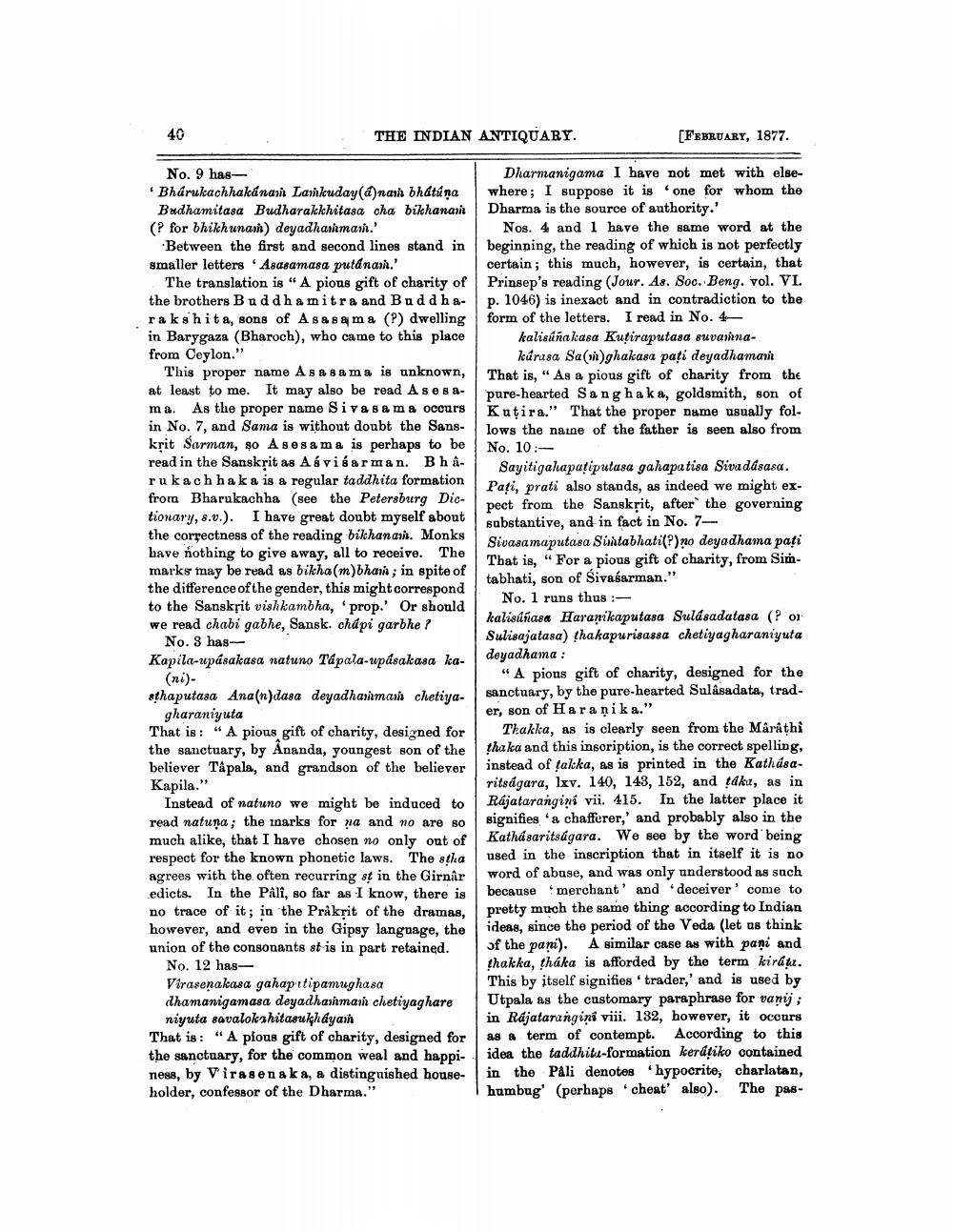________________
THE INDIAN ANTIQUARY.
[FEBRUARY, 1877.
No. 9 has
Dharmanigama I have not met with elseBhárukachhakánann Larkuday(a)nan bhátúna where; I suppose it is one for whom the Budhamitasa Budharakkhitasa cha bikhana Dharma is the source of authority.' (? for bhikhunan) deyadhanman.'
Nos. 4 and I have the same word at the Between the first and second lines stand in beginning, the reading of which is not perfectly smaller letters 'Asasamasa putanan.'
certain; this much, however, is certain, that The translation is “A pious gift of charity of Prinsep's reading (Jour. As. Soc. Beng. vol. VI. the brothers Buddha mitra and Buddha- p. 1046) is inexact and in contradiction to the rakshita, sons of As&sama (?) dwelling form of the letters. I read in No. 4 in Barygaza (Bharoch), who came to this place kalisúnakasa Kuțiraputasa suvashnafrom Ceylon."
kúrasa Sawghakasa pați deyadhamani This proper name A sasama is unknown,
That is, " As a pious gift of charity from the at least to me. It may also be read Asesa
pure-hearted Sanghaka, goldsmith, son of ma. As the proper name Sivas & m & occurs Kuţira." That the proper nume usually fol. in No. 7, and Sama is without doubt the Sans
lows the name of the father is seen also from krit Sarman, $o Asesama is perhaps to be No. 10 :read in the Sanskrit as As visarman. Bha
Sayitigahapatiputasa gahapatisa Sivadásasa. rukach haka is a regular taddhita formation
Pati, prati also stands, as indeed we might exfrom Bharukachha (see the Petersburg Dic
pect from the Sanskrit, after the governing tionary, 8.v.). I have great doubt myself about
substantive, and in fact in No. 7the correctness of the reading bilchanan. Monks have nothing to give away, all to receive.
Sivasamaputasa Sintabhati(P) no deyadhama pati The
That is, “For a pious gift of charity, from Simmarks may be read as bikha(m)bhana; in spite of the difference of the gender, this might correspond
tabhati, son of Sivasarman." to the Sanskrit vish kambha, prop. Or should
No. 1 runs thus :we read chabi gabhe, Sansk. chápi garbhe ?
kalisifiasa Haranikaputasa Suldsadalasa (Por No. 3 has
Sulisajatasa) thakapurisassa chetiyagharaniyuta Kapila-upárakasa natuno Täpala-updsakasa ka
deyadhama : (ni)
"A pions gift of charity, designed for the sthaputasa Ana(n)dasa deyadharmari chetiya. sanctuary, by the pure-hearted Sulásadata, tradgharaniyuta
er, son of Hara nika." That is: “A pious gift of charity, designed for Thakka, as is clearly seen from the Marathi the sanctuary, by Ananda, youngest son of the thaka and this inscription, is the correct spelling, believer Tápala, and grandson of the believer instead of takka, as is printed in the KathdsaKapila."
ritságara, lxv. 140, 143, 152, and taku, as in Instead of natuno we might be induced to Rájatarangini vii. 415. In the latter place it read natuņa; the marks for ra and no are so signifies 'a chafferer,' and probably also in the much alike, that I have chosen no only out of Kathasaritsagara. We see by the word being respect for the known phonetic laws. The stha used in the inscription that in itself it is no agrees with the often recurring st in the Girnir word of abuse, and was only understood as such edicts. In the PAli, so far as I know, there is because merchant' and 'deceiver' come to no trace of it; in the Prakrit of the dramas, pretty much the same thing according to Indian however, and even in the Gipsy language, the ideas, since the period of the Veda (let us think union of the consonants st is in part retained.
of the pani). A similar case as with paņi and No. 12 has
thakka, tháka is afforded by the term kirágt. Virasenakasa gahap tipamughasa
This by itself signifies trader,' and is used by dhamanigamasa deyadhanmann chetiyaghare Utpala as the customary paraphrase for varij; niyuta savalok hitasulçháyarn
in Rájatarangini viii. 132, however, it occurs That is : "A pious gift of charity, designed for as a term of contempt. According to this the sanctuary, for the common weal and happi- idea the taddhitu-formation keräţiko contained ness, by Virasenaka, a distinguished house in the PAli denotes hypocrite, charlatan, holder, confessor of the Dharma."
Thumbug' (perhaps cheat' also). The pas




